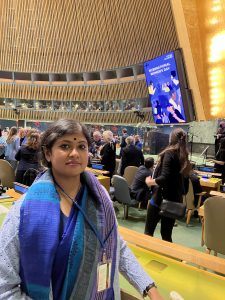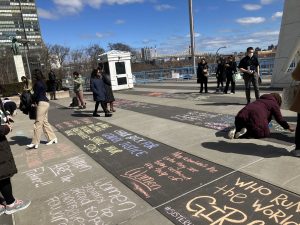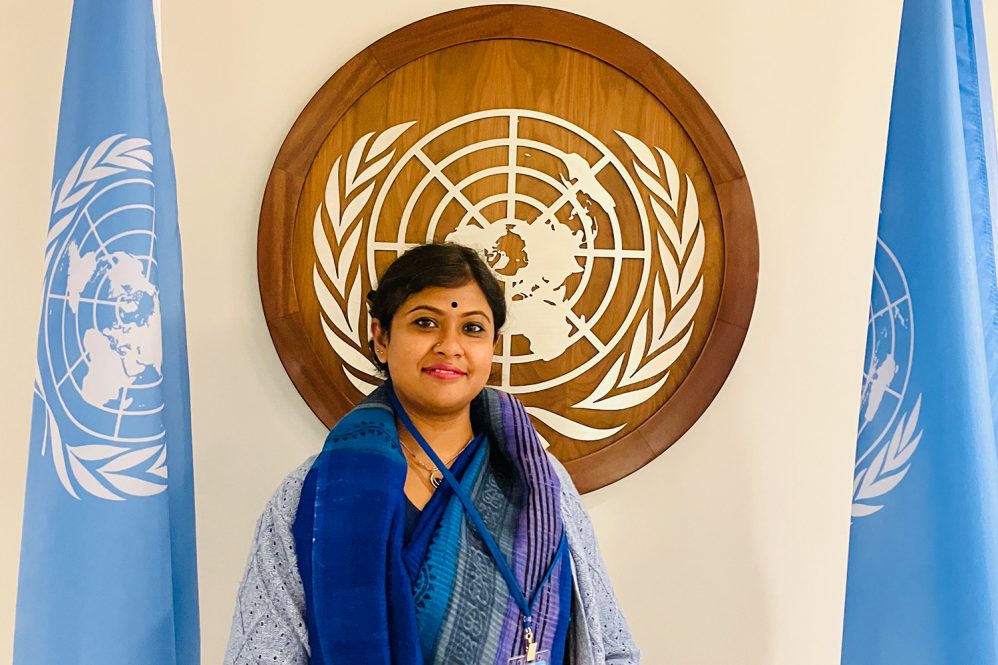The U.N. General Assembly Hall in New York has been the site of historic moments and notable speeches by world leaders and activists alike, from Barack Obama and Angela Merkel to Malala Yousafzai and Greta Thunberg. Last month, hundreds of member-state delegates celebrated International Women’s Day in this hallowed hall with activists, NGO representatives, and scholars from around the world—including UConn graduate student Rianka Roy.
Roy ’21 MA, a Ph.D. candidate in sociology, served as one of 20 delegates representing the Sociologists for Women in Society (SWS), a nonprofit professional network of feminist sociologists and activists, at the 67th Session of the Commission on the Status of Women (CSW) from March 6-17 at the U.N.
CSW, founded in 1946, facilitates annual dialogues between U.N. entities and civil society organizations on topics related to the promotion of gender equality and women’s empowerment. This year, the commission’s priority theme was “innovation and technological change, and education in the digital age for achieving gender equality and the empowerment of all women and girls.” Roy reflects with gratitude on her own journey at UConn, which led her to this prestigious event.
“It was really fabulous because, being in that network – which was possible only because I came to UConn – I could actually be in conversation with so many activists and researchers who are looking at issues of gender and technology coming from so many different parts of the world,” she says.
‘They Have Created That Space’
Roy came to UConn in 2019 as a graduate student from India with several degrees, including an MPhil in English and Ph.D. in Media, Communication, and Culture, both from Jadavpur University. Teaching as an assistant professor in India, she felt she needed to know more about society, and wanted more training in research methods. She found herself attracted to UConn’s sociology department for its diverse faculty who conducted research in her areas of interest, such as gender and labor.
She currently attends two graduate certificate courses in human rights and women’s, gender, and sexuality studies, which have deepened her understanding of how rights differ based on location. Over her four years at the University, Roy has published eight articles with the help of her professors, a feat that usually takes significant time in the social sciences at the graduate level.

From her professors, Roy has also learned how to network in organizations like the American Sociological Association (ASA) and International Sociological Association (ISA), as well as SWS, which brought about her U.N. delegation. Roy says the UConn sociology department “has a very special connection with” SWS, as numerous current and past faculty members, including Manisha Desai, Bandana Purkayastha, Nancy Naples, Mary Bernstein, and Fumilayo Showers, have held leadership roles in the organization.
“They have created that space for graduate students like me to get involved in that organization,” Roy says.
‘I Could Bring That Global Dimension’
Roy studies how highly skilled and highly paid Indian technology workers organize for their rights as citizens in India and as immigrants in the U.S. She notes that these workers are considered a global labor force because of the transnational nature of technology.
“For example, the call center workers who are talking to people in the U.S. or the U.K. or other countries [while] sitting in India—all of that is happening in real time,” Roy explains. “And there is a power imbalance because they are talking to their clients, and they are in the Global South, and those people are in the Global North.
“This power imbalance means that they have to make all the adjustments. So, if [they’re] talking to somebody who is in the U.S., maybe it’s 10 in the morning in the U.S., and in India, it would be somewhere around 10 at night, and that’s pretty common,” which takes a toll on workers’ health and family lives, she says, especially for those who are expected to maintain homes and care for children.
Roy brought this knowledge to a meeting of the SWS International Committee, chaired by UConn assistant professor of sociology and Africana Studies Fumilayo Showers, where Roy first heard about CSW and its focus this year on gender and technology. The committee sought help in composing a set of recommendations to send to the U.N., and Roy volunteered.
“I enjoyed that work because my research is also related to technology,” says Roy. “So, I could share my expertise and insight, especially because I could see what happens in India as well as in the U.S. I could bring that global dimension.”
‘I Felt Really Empowered’
Soon after helping with the SWS report, Roy applied and was one of 20 people selected to represent the organization as a delegate to CSW at the U.N., attending with Showers, who says Roy made valuable contributions at the global assembly.

“Rianka has a well-developed research agenda for this stage of her graduate career,” Showers says. “She drew from her research to invite delegates and the U.N. audience to think about the dual role of technology as a tool of empowerment, for example, in facilitating transnational feminism through the activation and dissemination of feminist networks online, but also as a tool of disempowerment and discord.”
Roy has already shared several of her U.N. experiences with the global sociology class she teaches, including a video she saw about a group called STEM from Dance, which uses dance to spark the interest of young girls of color in STEM. It’s an example of joining different education methods in the classroom, something Roy often discusses with her students.
“Currently, our education systems everywhere, even in India, are very Eurocentric,” Roy explains. “We need to incorporate more voices, more experiences that are really diverse. So this – the bringing together of dance and technology in a very performative way – was really unique, and I was able to share that with my students at UConn.”
Roy says her experience as a delgate at the U.N. will continue to shape her work as a sociologist, activist, professor, and researcher, and ultimately holds immense personal significance for her.
“As a woman of color coming from the Global South, being in that space and sharing my ideas and identities with all those people—I felt really empowered,” she says. “And I’m going to cherish that experience for many years.”



